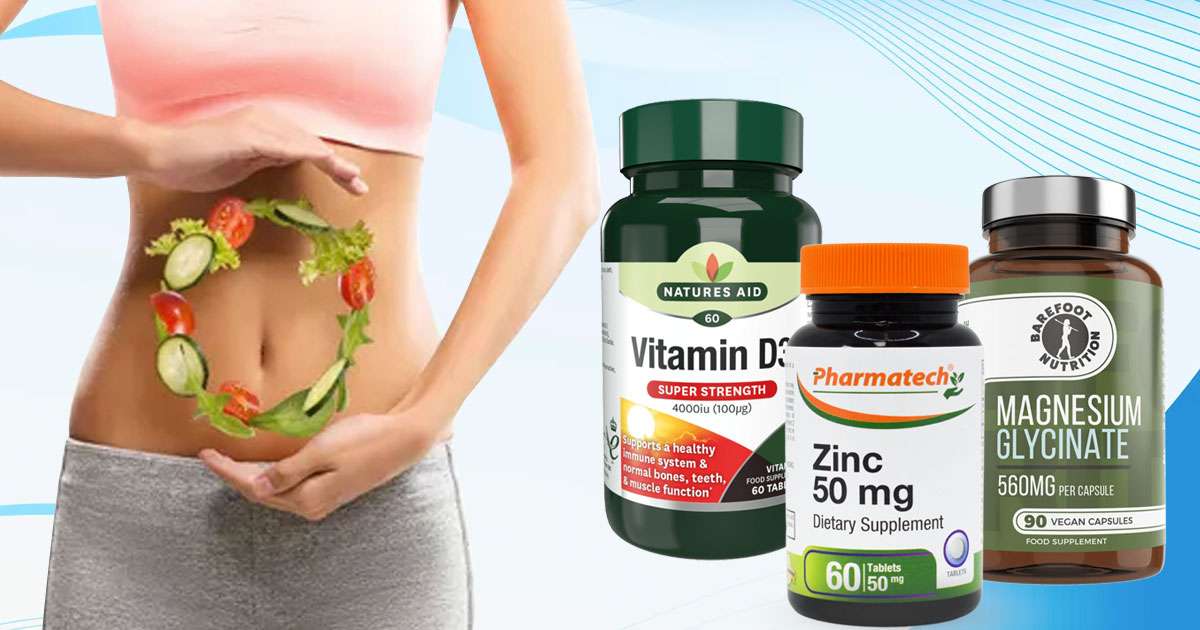The Top Vitamins and Nutrients That Keep Your Gut Healthy

Many people experience stomach pain, bloating, nausea, diarrhea, or constipation, showing how common digestive issues are. Around 70 million Americans deal with these problems. To feel better, some people try probiotics and prebiotics, but a balanced diet with the right vitamins and minerals is also crucial for a healthy gut.
The Best Vitamins that are Good for Gut Health
Discover the essential vitamins crucial for maintaining optimal gut health and promoting overall digestive well-being.
Zinc
Zinc, a vital mineral in the body, does more than boost immunity and heal wounds; it’s also crucial for gut health, according to a 2022 study. It helps produce stomach acid for digestion, and, alongside sodium, maintains optimal acid levels. Moreover, zinc aids in tightening gut cells, preventing leaky gut, and preventing food intolerances. You can find zinc in dairy, eggs, legumes, nuts, and seeds, but the best sources are oysters, red meat, and poultry for better absorption.
Magnesium
Magnesium is a special mineral that helps keep your gut working well. It relaxes your gut muscles, making it easier for food to move through and preventing constipation. Not getting enough magnesium can cause tummy troubles like constipation, bloating, and bellyaches. That’s why it’s important to eat foods rich in magnesium, like spinach, avocados, anchovies, and dark chocolate, as recommended by health experts.
Vitamin D
Vitamin D isn’t just made for bones—it’s also important for a healthy gut. It helps control the immune system, especially in the gut, which fights off germs. Not having enough vitamin D can hurt your gut, making your immune system weaker and causing more inflammation. To get enough, spending time in the sun helps, and eating foods like oily fish, egg yolks, butter, beef, liver, and other meats is a good idea.
Vitamin A
Getting enough vitamin A is good for your eyes and can help you achieve a healthy gut. Like zinc, vitamin A helps your gut’s protective lining stay strong, keeping out harmful stuff. It also boosts your immune system, helping your gut stay healthy. But not having enough vitamin A can mess up your gut. A 2022 study found that low vitamin A levels can change the balance of good and bad bacteria in your gut. Luckily, you can find vitamin A in foods like eggs, fish, liver, and fortified foods. Plant foods like leafy greens, sweet potatoes, carrots, and squash have beta carotene, which your body can turn into vitamin A.
Selenium
Selenium isn’t just for your thyroid—it’s also important for your digestion. It helps your pancreas make digestive juices, which keep your digestion running smoothly. Selenium also fights inflammation and damage in your gut. Plus, it can help keep your gut bacteria in balance, as found in a 2021 study. To make sure you get enough selenium, eat foods like corn, garlic, milk, Brazil nuts (if the soil has enough selenium), meat, seafood, and eggs.
Vitamin C
Vitamin C isn’t just for your immune system; it’s for your gut as well. It helps your gut stay healthy by fighting off bad stuff and helping your body soak up nutrients. Plus, it helps make collagen, which keeps your gut lining strong. You can get enough vitamin C by eating lots of fruits and veggies like kiwi, guavas, bell peppers, strawberries, broccoli, and oranges.
B Vitamins
Some B vitamins really help improve your gut health. Vitamin B1 keeps your digestion running smoothly, and vitamin B6 helps make chemicals that control how your intestines move. B9 and B12 are also important for keeping your gut cells healthy and preventing tummy troubles. Plus, certain B vitamins can help good gut bacteria grow, like vitamin B2, as found in a 2021 study. You can get B vitamins from lots of foods like whole grains, nuts, mushrooms, greens, avocado, eggs, fish, meat, and dairy.
Factors that Affect Gut Health
Keeping your gut healthy involves more than just getting the right nutrients. It’s a big job that requires lots of things, like changing what you eat and how you live. That means getting better sleep, avoiding bad stuff in the environment, and calming down your nerves. Plus, dealing with stress and tough times can really help your gut get better.
When you’re stressed or hurt, it’s harder for your body to stay healthy, so it’s important to take care of those feelings too. Having fun and doing things you love can also make your gut feel better. It’s not just about taking probiotics or prebiotics—it’s about looking at everything together to make your gut strong and happy in the long run.
Choose Good Vitamins for a Healthy Gut
There are tons of good vitamins for your gut’s health. To make your gut stronger, eat foods with lots of good nutrients like zinc, magnesium, selenium, and vitamins A, D, B, and C. These help keep your gut lining strong, reduce tummy inflammation, and keep your digestion on track. But it’s not just about food—getting good sleep, avoiding bad stuff in the environment, and dealing with stress are important too. Remember, everyone’s gut is different, so what works for one person might not work for another. If you need help figuring out what’s best for you, talk to a dietitian—they can help you find your own path to a healthier gut.

